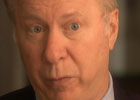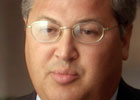The attitudes, experiences and convictions driving the Bush administration's views on the Constitution and the role of the president, drawn from FRONTLINE's interviews for Cheney's Law.
- David Gergen
- Ron Suskind
- Barton Gellman
- Martin Lederman
- Jack Goldsmith
- Bruce Fein
- Bryan Cunningham
- Related Link
- Presidential Power -- The Bush Legacy
Will the battles to expand executive power leave the presidency more powerful than it was in 2000?
David Gergen
Adviser to Presidents Nixon, Ford, Reagan and Clinton
My own interpretation is that they came in, spurred by Dick Cheney, to have an enlarged sense of the presidency, to have a penchant for secrecy, to basically have a view that the Congress, in effect, works for us, not with us; that we're the lead branch, not a co-equal branch.
I think what 9/11 did was reinforce and strengthen every one of those impulses. I'm sympathetic in one fundamental respect, and that is I've had the privilege of working at the White House many times now. We never before in our history had people working in the recesses of the White House who had to run for their lives through the streets of Washington. I can only imagine what impact it had, of their saying: "Never again. We must defend this at all costs. If the Congress doesn't understand this, we do, and we're going to protect the country."
I'm sympathetic with that. A lot of us on the outside who didn't go through it have to understand there's a residue that lives on and on in the people who went through that horrible day.
It's clear it's had a lasting impact on everything else that's happened, whether it's the government's intercepts or surveillance or exerting executive privilege, or treating Congress with contempt on the questions of White House people producing documents or testifying. They started with this view. But I think that day, 9/11, was such a wrenching one that it confirmed everything they might have thought, and it has made them extraordinarily rigid on these questions.
Ron Suskind
Author, The One Percent Doctrine
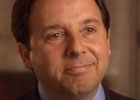
The expansion of executive power goes from a mandate to mission after 9/11, a mission with the survival of the country at stake. And that's a change. The fact is, before 9/11, it was a matter of push and shove. Cheney, [his adviser David] Addington, others were saying, "We need to protect, defend, create a kind of wholeness to executive authority." But after 9/11, they truly view it as the stuff that the country will have to basically rest on for its survival.
Now the Cheney doctrine, here's the way that works -- and it all comes together in a moment. It's November 2001 and Tenet and others are briefing Cheney -- Condi's there, others -- about harrowing intelligence that they have discovered that Pakistani nuclear scientists sat with [Osama] bin Laden and [Ayman al-] Zawahiri just a few weeks before 9/11 and talked about logistics. They drew some diagrams. They talked about getting access to highly enriched uranium. This is briefed to Cheney in one of these hair-on-fire briefings.
Cheney says to start the briefing, "We need to think in a new way about these low-probability, high-impact events." By the end of the briefing, he has that new way. He says, "If there's even a 1 percent chance that WMD have landed in the hands of terrorists, we need to treat it as a certainty." …
And that becomes the core of the U.S. playbook from really that moment forward. It articulates certainly a lot that's been talked about or what people are thinking in the weeks after 9/11. But it distills it down to a kind of cause for action. If there's even a 1 percent chance, we can't afford not to act as though it's a certainty, especially, as Cheney says, with the imperfections of evidence gathering and of process.
Essentially what he does at that moment is say that we will probably have to be a country ruled by men rather than laws in this period. … If there's a 1 percent chance, we have no choice but to act, whatever the statute may say, whatever Congress may say, whatever history may say. We have no choice. It's so important to understand that that's what drives Cheney, drives Bush, drives Addington and drives others, as they feel they're standing on the wall, protecting the nation in a way that no one else is. That gives them the force of clarity, principle and, in a way, personality to win again and again these battles.
Barton Gellman
The Washington Post
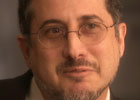
They're all very skeptical of the idea that international law can bind a U.S. president, even though the whole structure of post-World War II international law, Geneva Conventions, the Hague, and so on, are the product of the United States and United States policy over decades. It was the U.S. government that led the way to the creation of international war crimes and international regulations of what is the law of war. It was a very explicit response to the crimes of Nazi Germany and Japan in World War II. And now you have in the White House a group that believes -- and they have a legal argument on their side that says the Constitution is the ultimate authority -- that international law, even law to which the U.S. government is signatory, cannot bind the president.
Likewise -- and this is probably the most radical position that Cheney and Addington are taking -- they believe that even the coordinate branches of government -- Congress which makes laws; the Supreme Court which interprets them -- cannot limit the president's authority as commander in chief because the president has an independent obligation to interpret his constitutional powers. Only he can decide what the limits are. …
You have to understand that David Addington, Dick Cheney, are true believers in what they are saying. They not only believe that the president has these powers, that the president has effectively unlimited powers as commander in chief, but that he has to; that if he doesn't, this country will be at grave risk. There's no self-dealing here; there's no personal corruption here; there's no personal benefit to taking that view. Dick Cheney held it when he was a member of Congress. They're true believers, and they said, "You don't get anything in this world by asking for less than what you want and what you think you need. So we're going to take that position, and we'll see what happens."
Martin Lederman
Attorney adviser, Office of Legal Counsel, 1994-'02
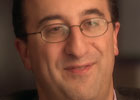
What do you think the vice president's views are?
There are principally two views about the Constitution and the role of president, which overlap and coalesce at many points. The first is the so-called unitary executive theory. … [Cheney] believes that the president and the president's close advisers should have the final word -- indeed the only word -- on all matters within the executive branch. And so he has made it, it seems to me, a central part of his philosophy and his practice as vice president to try to stamp out or to relegate to the margins any dissenting views, whether it be in the military among the uniformed military and the JAGs; or in the intelligence agencies, when they're not giving him the stories about Iraq and elsewhere that he wants to hear; or at the Department of Justice, when they're coming up with legal opinions that don't correspond to the legal judgments that the vice president has. He really believes that the president should be the be-all-and-end-all within the executive branch. That's the unitary executive theory.
The second component, or the one that I've been more focused on, is not something internal to the executive branch, but that the vice president believes that Congress has very few powers to actually constrain the president and the executive branch. That is to say that statutes, treaties and customary international law are in many respects unconstitutional to the extent that they cabin the president's discretion, particularly in matters of national security and defense and war. …
In that respect, what's been really quite radical are the president's and the vice president's views that in numerous cases, statutes duly enacted by the Congress are not necessarily binding on the president to the extent that they impinge on his discretion about how to best fight the enemy.
Jack Goldsmith
Assistant attorney general, Office of Legal Counsel, 2003-'04
They were deeply principled about executive power, so deeply principled that even in the face of terrible political consequences, time and time again they would assert these arguments out of principle, because they thought it was the right thing to do. Sometimes I thought that the greater the political costs, then the more tightly they would stand by the principle, because that was kind of a way of measuring their commitment to the principle.
You said it was almost theological.
I described it in my book as having a theological commitment to executive power. I could have used the word "ideological," but that is a more charged word even than "theological." What I meant by that was that this was a set of beliefs and commitments that kind of trumped consequences, and it was more important to hold onto these beliefs in many instances than it was to achieve the political results. …
[How many of the administration's post-9/11 actions are being driven by ideology, by the desire to increase executive power?]
I don't think that the aggressive actions that they took after 9/11 were themselves viewed as primarily part of the program of expanding executive power. ... I do think, however, that in acting aggressively, as any president would in that situation, that the White House's conception of executive power and its agenda for executive power informed everything it did. There's no doubt that they had certain attitudes toward how to proceed, and that led them to proceed in certain ways.
So it's an attitude. It's not an every day getting up and saying, "What can I do to further the cause?"
Yes, that's right. I don't think they woke up every morning saying, "Let's do whatever we can in this war to expand executive power." I think they woke up every morning saying, "Let's do whatever we can today to protect the country." ...
Bruce Fein
Associate deputy attorney general, 1981-'83
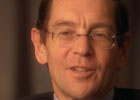
It largely stems from their conception that the commander-in-chief power, the authority to wage war, includes anything the president thinks may be helpful to win. There are no limits. … Well, why do we have a Constitution anymore? When you declared war on international terrorism, did that mean the document becomes irrelevant, other than the commander-in-chief clause that absorbs everything else?
There are no answers, just, "We haven't gone that far." That's not very reassuring. But that's basically sort of a simple-minded view, is that the conduct of the war, as it's been described as a war against terrorism, includes the power to do everything under the sun. And so it must be legal if you claim it's useful. …
We have waged wars before, and I don't think I'm being audacious to suggest that Adolf Hitler and Hirohito and Mussolini and Joe Stalin were more dangerous to us and our survival than Osama bin Laden. As abominable as he is, he's not the Red Army with 3 million [troops]. He doesn't have 20,000 nuclear warheads. He's not able to commit a Pearl Harbor with bombs and a whole air force. And despite that more menacing threat from these international tyrants, we still kept the Constitution and separation of power.
Bryan Cunningham
Deputy legal adviser, National Security Council, 2002-'04
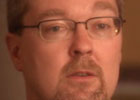
I think it's a constitutional, fundamental legal position, and in some ways, on some occasions, against the partisan interests of the party. I don't think my experience was that they -- the vice president's office and David [Addington] in particular -- were acting politically. They were not acting in a partisan way.
Let me give you an example: The very first time that I'm aware of that the Bush administration asserted an expansive executive authority position was when it was tremendously detrimental to the political interest of the Republican Party. Remember all the Clinton pardons? The Republican Congress demanded access to all of the pardon records from the last couple weeks of the Clinton administration. … You can remember that was a huge political story.
Bush and Cheney -- and I'm sure, although I wasn't there, Addington -- took the position, "You're not getting a paragraph of the Clinton administration documents." That was completely against their party's political interest, but it was because they believed, I think, that it was more important to protect the presidency than the current president.
I'll give you another example: the 9/11 Commission. This is one I have very, very personal experience with [as a White House liason to the commission]. One of the very first times that I met with anybody in the Justice Department about the process of the commission when it was just getting started, one of their senior career lawyers who had been there forever said, "Here's what you guys are going to do because every president does this. You're going to stand on your constitutional obligation of executive privilege, and you're going to cave in at the absolute least politically opportune moment that you possibly can." To some degree, that's just exactly what we did.
The political best thing for the president to have done, in my opinion, would have been to put Condi Rice up in front of the 9/11 Commission at the very beginning and let her tell her story, and we refused to do that. We forced the 9/11 Commission to go through what I think are actually the constitutionally required hoops that the courts tell you to go through, which is, you know, give them everything you can without sacrificing your constitutional position as the executive, and continue to make accommodations, and don't give up any of your prerogatives unless you decide they can't do their job without it.
I think Addington's position all along was protect the presidency more than the president. So issue after issue, he would want to take a very hard line -- what I think is an actually correct constitutional position, even understanding that it was going to be politically damaging to do so. … I think it was a matter of constitutional conviction. Now you can argue whether it was right or smart or good government, but I don't think it was venal. I think it was truly felt.
home . introduction . watch online . interviews . themes . join the discussion
producer's chat . readings & links . site map . dvd & transcript . press reaction
teacher's guide . credits . privacy policy . journalistic guidelines . FRONTLINE series home . wgbh . pbs
posted october 16, 2007
FRONTLINE is a registered trademark of wgbh educational foundation.
main photograph © corbis, all rights reserved
web site copyright WGBH educational foundation
